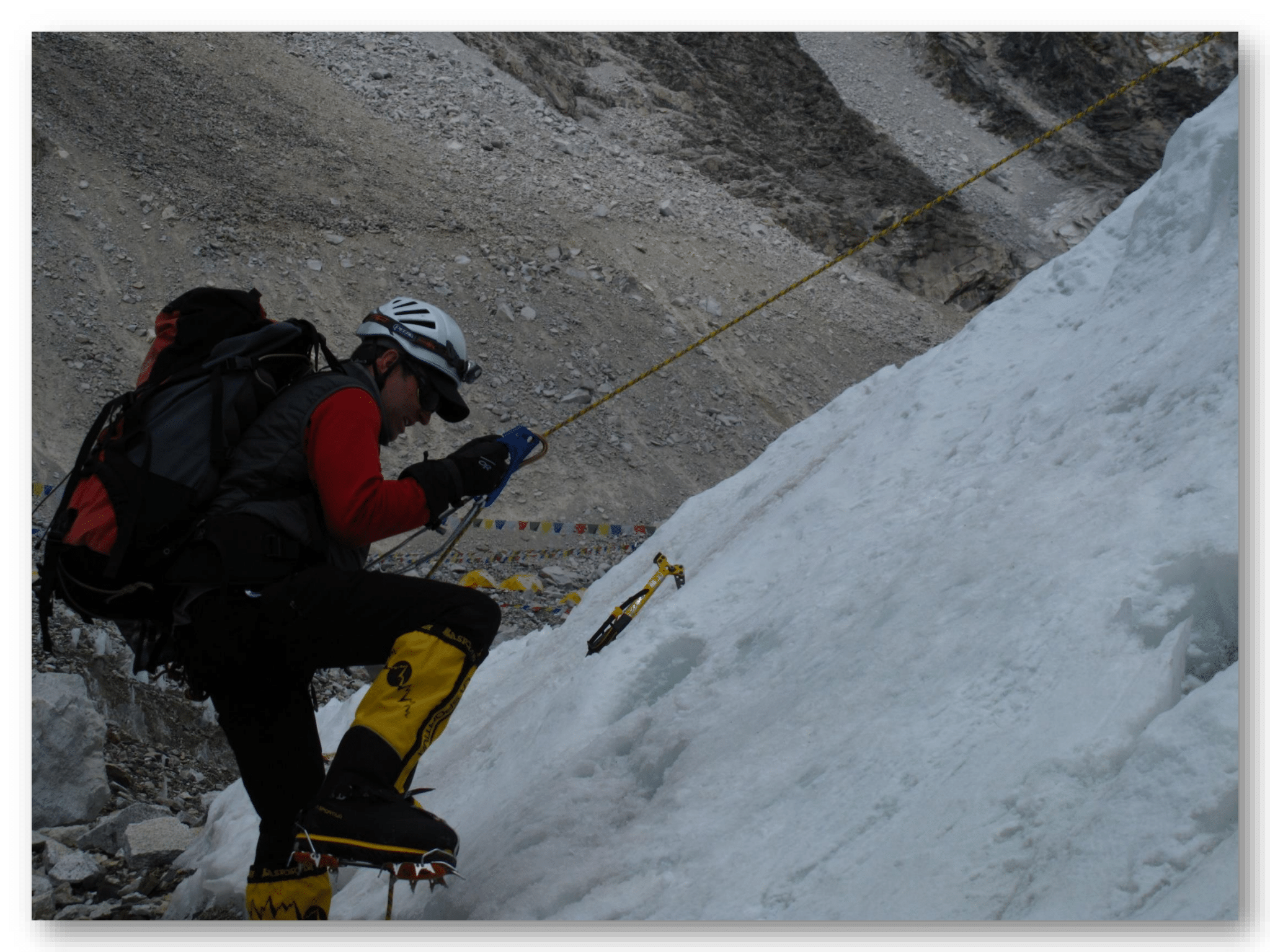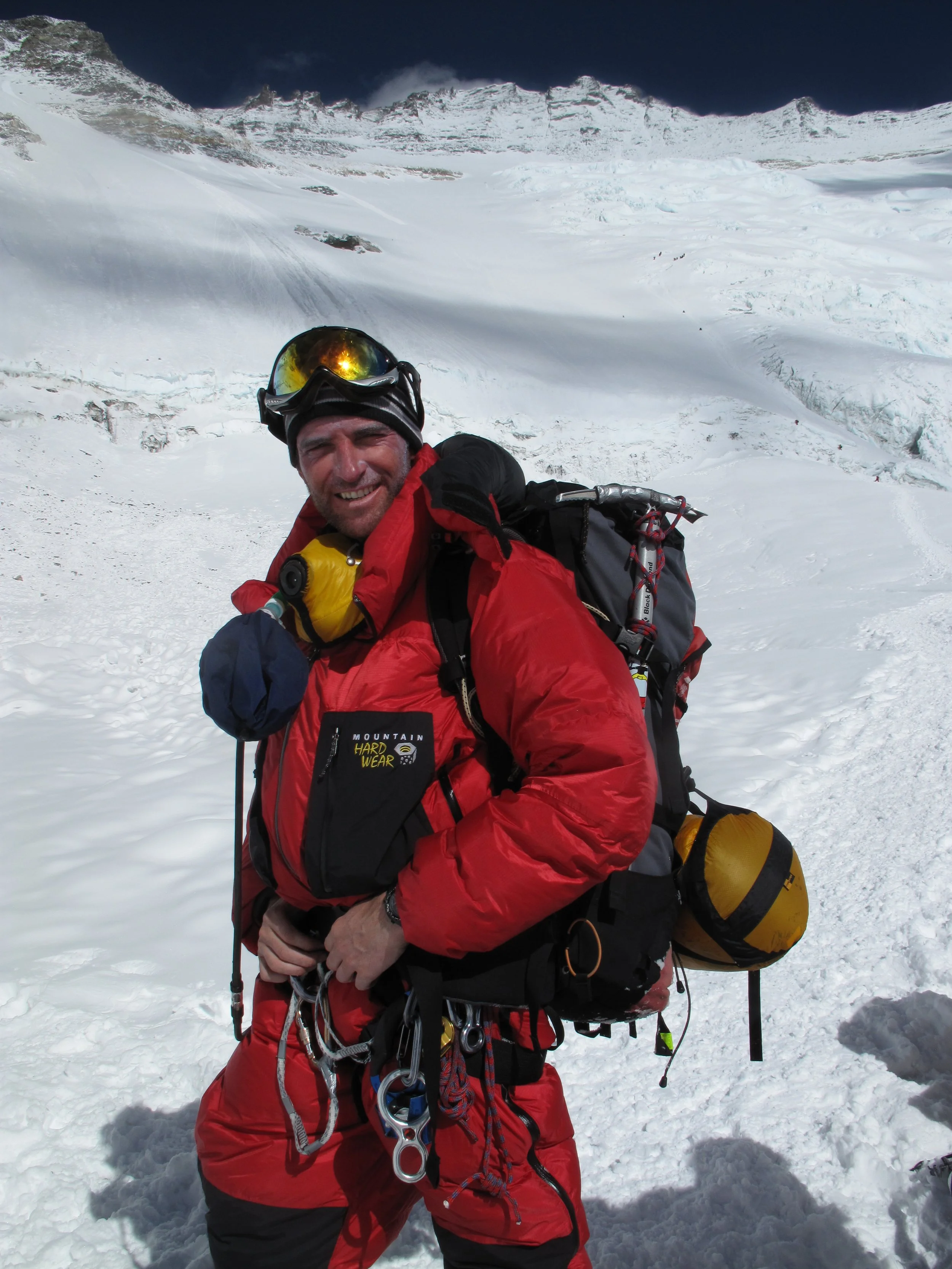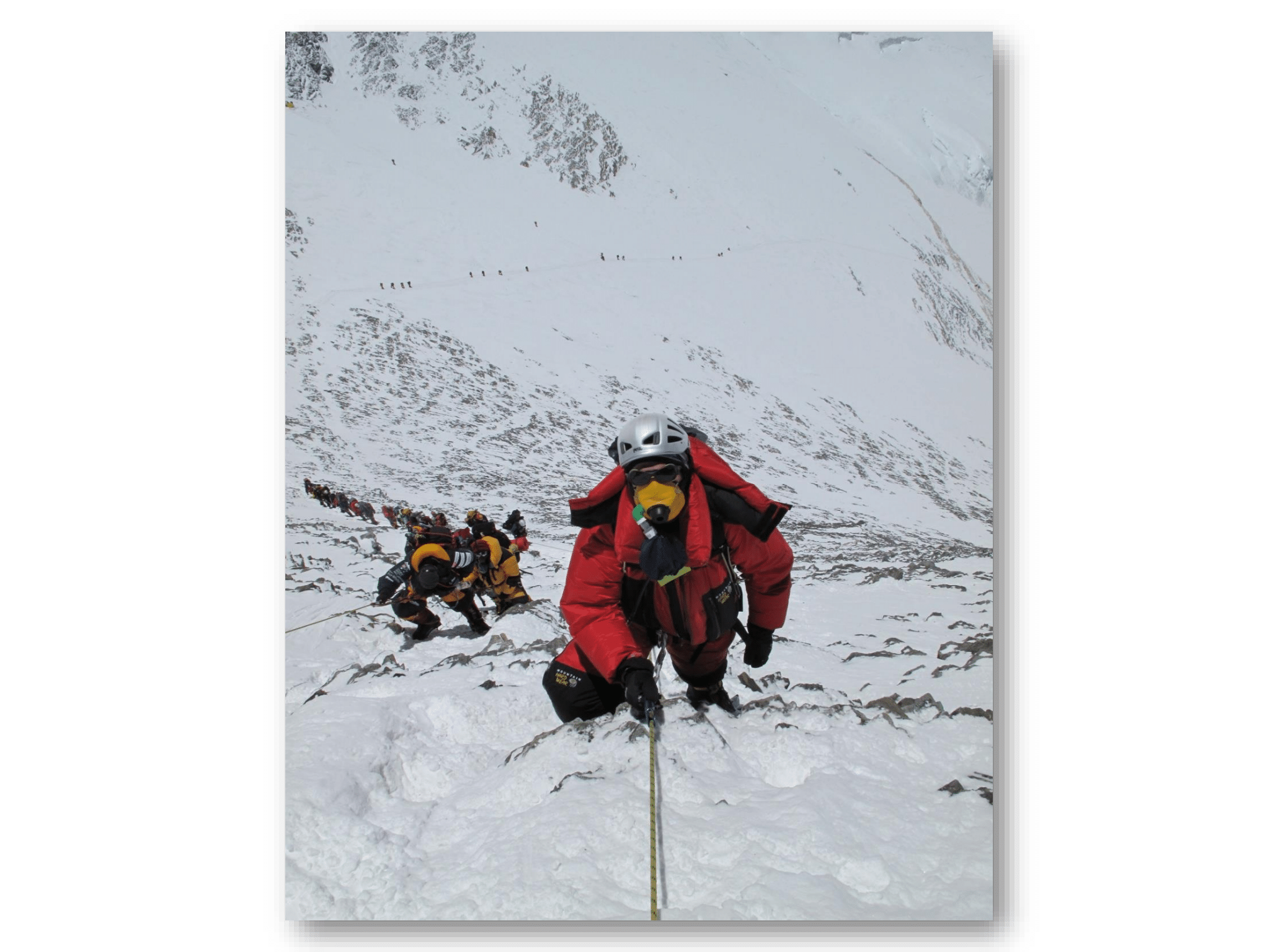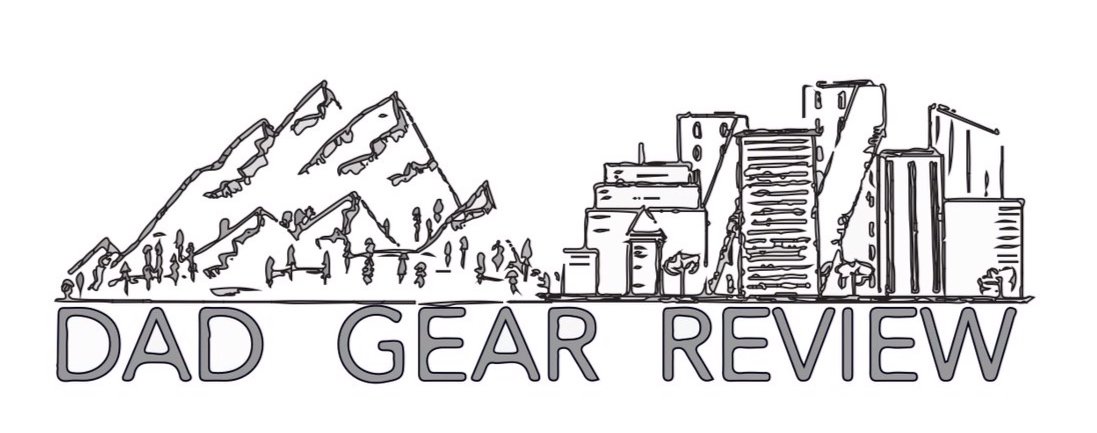
“We sleepwalk through life and then you come back from Everest and you realize that every moment we're here is a moment cherished and a moment that we can do something with.”
— Vivian James Rigney
Mountain Climber, Leadership and Executive Coach, and Author
Vivian James Rigney Talks to Dad Gear Review About His Harrowing Everest Ascent and the Surprising Way It Changed His Life
By Steven John
Vivian James Rigney has climbed every one of the famed Seven Summits. That means he has reached the highest point on each of the planet’s seven continents, those being Mt. Everest (Asia, 29,035 feet), Aconcagua (South America, 22,829 feet), Denali/McKinley (North America, 20, 230 feet), Kilimanjaro (Africa, 19,340 feet), Mount Elbrus (Europe, 18, 510 feet), Mount Vinson (Antarctica, 16,067 feet), and Australia/Oceania (Puncak Jaya, 16,023 feet).
And it means that Rigney is a member of a small, elite number of human beings who have hauled themselves boot over boot, hand over hand, by ax and crampon and ascender and rope – and through sheer, raw will – up these awesome peaks. Yet when you talk to Vivian James Rigney, as I recently had the pleasure of doing, or when you read his book Naked at the Knife-Edge, the fact that he has completed these Seven Summit ascents hardly comes up – the climbs occupy less than two full pages of his book and were essentially a footnote to our long conversation.
Here is a man with about as many bragging rights as anyone breathing today, and what does he focus on instead of his accomplishments? The main theme of Rigney’s book, and of much of his life following the events that make up its narrative of the Everest ascent, is about vulnerability and humility, and how embracing rather than rejecting these emotions can help us catapult forward in life.
Having spoken to a number of accomplished mountain climbers over the years and having read many accounts more, I wanted to start the Dad Gear Review chat with Vivian James Rigney with a question few mountaineers are asked. So after some initial conversation to get to know one another, I started the more formal interview with this: “What were some aspects of the expedition, if any, that were surprisingly and pleasantly easy?”
“That's a good question, no one's ever asked me that one,” Rigney replied, adding: “So a lot of credit for that.” Then he took the time to reflect for a while before answering thoughtfully.
“What was easy? I would say – I may shock you with this one – the ease of being with yourself for two months. On the one hand, it’s difficult, the [transition], because when we leave New York City, you can imagine, I live in NYC, it's a wildly busy place and you get off in Kathmandu, and Kathmandu is also an extremely busy city. Then you leave there, and then arrive at Lukla airport, which is the foothills of the Himalayas, and all that busyness just dissipated. Literally the moment you get off the twin propeller plane. And it's immediate sense of: ‘I don't have my gadgets. I don't have distractions. There's no electricity. There's no wi-fi. This is just me.’"
“And it's an unusual existence to be alone with your head 24-7 with so few distractions. And I found that ultimately surprisingly easy, although during that period, of course, there were things that came into my mind about things that I wanted to think about that I had not thought about before, things that I hadn't faced before. So with that piece came also inner dialogue. Some of it was negative, and that was a journey in itself. But just the idea of being at peace with yourself.”
“The other thing I can share is we went through these villages, and just seeing children with none of the modern devices that they have today, playing with dogs with sticks, just laughter in every village we went to, people with very little, and just that humbling experience of acknowledging that happiness is about a moment as opposed to what we own or what we're aspiring to. The moment was precious. And that was something that really struck me and is still with me today. I’m trying to obviously live it every day, but it's profound in Nepal.”
I shared with Rigney having experienced much the same thing myself, seeing the joy young Kogi children expressed in the Sierra Nevada de Santa Marta mountains of northern Colombia – more stuff and a packed schedule does not bring happiness. And in fact, for many years after Rigney’s climb, a packed schedule relegated his experiences to his own mind and reflections. Why did he choose to write Naked at the Knife-Edge now, a decade after his summit success on Everest, I wondered.
“I came back from Everest thinking, well, I think everyone has a story to tell,” Rigney said. “Most of my fellow climbers had written stories within the first 18 months from returning from the expedition. And I knew I had a story to tell. It's a surreal experience being on a mountain for two months. But something inside me said that I have a story to tell, but I'm not quite ready to tell that story. And the book articulates the journey, the personal journey I went on in climbing Everest and in getting down alive. And I felt it was a marination process that needed to happen. I got busy with life, but marination was happening, then the pandemic hit and [I had an] immediate realization: ‘The time is now.’”
“And it's funny because when the pandemic hit, there was this idea of vulnerability, of society and of people. The whole world was in trouble like: ‘What is happening and what do we do?’ That brought Everest back to me in a way, that feeling of not being in control and desperately wanting to be in control and trying to join the dots on: ‘So what does this mean?’ And that it felt like the perfect time to write it. And I literally dusted off the keyboard and put pen to paper, as it were.”
Having read the book shortly before talking to Rigney, before discussing the expedition itself, I wanted to ask him something you can’t find in the pages of Naked at the Knife-Edge, because it’s a notion a climber can only address after a climb is in the bag. Would he do it again?
I asked Vivian: “After the climb was over, did you get some of that mountaineer's amnesia and think: ‘That wasn't so bad. Maybe I should do that again?’ or was it always clearly a: ‘That was a once-in-a-lifetime experience!’”
“Always clearly once-in-a-lifetime experience,” he said. “Yeah. I think the trauma never really goes away. So people ask me, would I do it again? And the answer is, OK, would I do it again if I had not summited it? I think yes. I don't regret doing it because it gave me so much. It was an exponential experience for me personally, physically, mentally, emotionally, spiritually, all aspects. But in terms of, would I do it a second time? No. I count myself lucky to be here, to have got up and got down alive.”
“In your work, you tend to be in a lead position or working with leaders, but on Everest, you had team leaders and had to fully commit to being part of a team,” I asked Rigney. “Did that come easily? And more to the point, did it leave a mark that's still with you today?”
“Yeah. I think you have to give up,” Vivian replied. “So you have to trust the leaders you're going with. There were two leaders in our expedition. There were obviously the lead guide and the co-lead guide. And then there were the Sherpa, and that's interesting: in Nepal, the Sherpa are equal stakeholders. In other parts of the world, you go mountaineering, the Western climbers go in there and they try and take control and assert their experience. And they tell the locals what to do, what they need, and what support they need, and so forth. So they take that position.
“In Nepal it's very different. You go in there and the Sherpa are physically strong, mentally strong, humble, wise, it’s a very strong community. And you immediately realize that when the Western guides link up with the Sherpa and it becomes a true partnership. People are communicating with each other. So as a climber, it was clear that I had these really talented people that I would trust my life with. And that was an unusual experience compared to the other mountains. On the other six summits that I climbed that was not necessarily the case.”




Reading the book makes it clear that Rigney spent much of his time on Everest thinking about people who were far away. So I asked him about those thoughts. “Family and legacy and the like were much on your mind or became much on your mind during much of the expedition. Did that sense of thinking outside and beyond yourself continue on after the climb, or was it more something you reflected on during the expedition?”
“It definitely continued onwards,” Rigney answered. “The idea of getting rid of the noise in your head, in my head, the idea of focusing what's important, the idea of prioritization, letting go of all the stuff that's irrelevant... and there's lots of it... that was coming because when you're on a mountain, the one word you have in your mind is legacy. And when you and I are sitting here talking about this, legacy is something we're thinking about 20, 40, 50 years, whatever – if we're lucky, we have a long run, and that's great. When we're on the mountain, legacy could be the next five minutes. It could be the next day. There's no guarantee you're not going to fall into a crevasse, or there's going to be an avalanche or somebody's going to slip on a rope and pull you with them. All of that. So legacy becomes very real.”
“And for me, I was 39 years old, and that was a wild feeling to think: ‘Wow, I cannot change what I've left down at sea level. How I have been with friends, family, girlfriend, all of that is cast in stone because I'm here on this mountain. I'm disconnected from everyone. I can't change a thing. If it ends for me in the next hour, what I've left down there is my legacy.’ And the big thing that came into my mind then was: ‘Well, am I happy with that?’ And the answer was no, not really. Not really.”
“Had I told people that I valued them enough, had I told people what they had done to help me in my career or my life, had I told people in many cases their influence or what I wanted? And the answer was no. We sleepwalk through life and you come back from Everest and you realize that every moment we're here is a moment cherished and a moment that we can do something with.”
Reflecting on that answer, I next asked Rigeny: “Did you feel the accomplishment of climbing was primarily for yourself or in some way for your parents, for your siblings, for others? Was it something that you did because you wanted to do it, or did it become something you were doing for other people?”
“I went to the mountain thinking I was doing it for myself,” Vivian James Rigney explained. “When I got up onto the mountain, as you’ll see when you're reading the book there, the harrowing chapter is obviously the summit chapter, where I questioned: ‘Why am I here?’ And I thought at that point it was clear why I was there. I was climbing. It was the seventh summit. I was pushing myself. I had got experience before. I was applying that experience. All this good stuff. I was going to come down the mountain and obviously people would be happy for me. I guess part of it was ego in there; I would be recognized as somebody who'd done this stuff.”
“And then on summit day, when I hit the metaphorical wall, and I thought it was all over for me, thought I was curtains, thought: ‘I won't be coming down this mountain,’ that's when I asked this question, "Why are you here?" And that was a question I asked in my own mind, and it came from a very deep place. And the answer was: ‘I don't know.’
And the next line that came into my brain as it answered itself, my subconscious mind asked that question and I couldn't think of an answer, so my subconscious mind gave me the answer with more questions. And it said: ‘Why are you always trying to prove how smart you are, how strong you are, how talented you are, how good a son you are, how good a brother you are, how good a person you are?’ And those questions kept coming, almost like they weren't really questions. They were rhetorical questions. They were statements. And the answer was clear. I didn't really know why I was there. And that was a painful moment because one likes to think that every day we're on this earth, we're doing something with purpose, something with meaning.”
“You're going to be on Everest, that's a big deal,” Rigney went on. “So not knowing why at 8,000 meters or 29,000 feet, that's not a good answer. And there was a huge trauma associated with that at that point in time because I thought my legacy would then be done. The clock would stop. And then not only would I have not had the influence or said the things that I wanted to say to people that I'd left down below, but I didn't know why I was there in the first place. So those two things were pretty heavy on my heart. When I came down the mountain, I was extremely conscious of not being in that situation ever again.”
“What it does seem that sensation led to is this acceptance of vulnerability,” I said, adding: “So why did that acceptance of vulnerability create such insight for you, insight that seems to have become actionable?”
“Because the vulnerability gave me strength,” Rigney replied quickly and with confidence. “And when I came down the mountain, there was one profound moment. So I got to the summit, and there's an extremely heavy summit day, and a hairy summit day. And I got down to camp, just above the Khumbu Icefall, it’s the most dangerous part of the expedition. So I'm almost at base camp. We're four hours from base camp, it’s our very last night on the mountain, and I grabbed a satellite phone, called my father. The phone rang. Phone rang again. I couldn't get through. Eventually it got through. He answered the phone and I heard his voice. He was always a tough guy when I was growing up, with high standards. Would never give us a compliment, but he'd tell his friends how proud of us he was. But he never wanted us to get too big for our boots.”
“But the moment I heard his voice, this tough guy, I burst into tears and I cried like a baby for at least one minute, wildly. And I just felt love. And he never said it to me when I was growing up. He never used that word. But I felt love and I felt the sacrifice that he and my mother had given me to have me, to give me an education, to give me the opportunities that I had. And after that one minute of immense release, almost like a dam bursting, literally like a thunderstorm, it stopped. Boom. And then I took a breath and then I said: ‘How are you guys doing?’ And he said: ‘We're fine.’ He said: ‘We're very proud of you.’ That was a moment. That language wasn't really used in our family before. And then we had a nice conversation for maybe one minute or so, and then, my dad is an accountant, so he's like: ‘I don't want to keep you on the phone too long. It's very expensive.’ This type of nonsense.”
“But I told him it was really difficult, and I told him I almost didn't get there, and that it was a traumatic summit day. That poured out of me. Anyway, we said our goodbyes. I got through to Khumbu Icefall. I got to base camp. I called my family again and I said: ‘I'm here.’ I didn't speak to dad, I spoke to another family member, and the first thing they said to me was: "Vivian, I heard you got to the summit. That's great. We're so happy for you and proud of you. But I heard it was very tough. You're telling dad it was very tough. You don't need to tell people how tough it was. You got atop Mount Everest, that's the only thing that matters. You don't need to worry about that!’ And I felt this anger come inside me and the anger was: ‘What a load of nonsense. Total BS!’ The conditioning of childhood came back, and I could see it so clearly for what it was.”
“Vulnerability makes me feel strong. This is the story. The fact that I released those emotions with my dad made me feel a million times better. It surprised him. It made our relationship better. It changed everything. And that idea that to be vulnerable and to be transparent and open is so powerful, and it brings that compass, almost that needle on the compass to true north, and north represents honesty, truth, being your best. That, for me, was something that I really wanted to put in writing. And the book is a lot about vulnerability and the strength that comes from that. But hey, there's no free lunch. You got to go through it in order to appreciate it.”



Vivian James Rigney did indeed go through it and came out stronger for having done so. Given that the climb had been 10 years back, I wondered just how often thoughts of Everest were on his mind today, the work on the book aside. “After a while, did times come when you realized: ‘I haven't even thought about the mountain in a few days,’” I asked him. And I wondered, too, what were the things that called Everest to mind.
“I'd say most days there was a moment of realization from something,” Rigney said. “It literally might have been that I'm in a restaurant and I'm with somebody and they're looking at a drinks menu and they can't make a decision to get a drink. And it's a summer's day. And I just say to the waiter: ‘Just give me a glass of cold water, please.’ And on Everest, it's a desert. There is no water. There's ice and snow, but you have to melt it. You can't just grab a mouthful of snow and ice. You'd freeze your mouth and that's not going to be good. So you realize that water is life-giving. And just having a glass of water would bring Everest back. And I love water now. Before I got to Everest, I liked a little something in water and flavor of this, flavor of that. Back from Everest? Water is just amazing. It's the best thing ever. So small things like that.”
As we neared the end of our talk, I wanted to ask Rigney a question he and any serious climber has had to consider many times, and one for which a perfect answer is not possible. “How much would life have been different after the climb if you had not reached the summit?”
“I'd experienced it before on one of the seven summits, the failure to summit, and having to go back and do it again. I think the vulnerability piece would've been there, for sure. Obviously I would've had to explain. People would've been asking me: ‘What happened? What happened? What happened?’ So you go into that journey. But I think the vulnerability would've been the same. Same result. The question is, would I have gone back to try a second time? And that's interesting. I can't answer that question. I don't know. On the one hand you say: ‘Of course I would've gone back. Tick the box.’ But the vulnerability was so powerful. When I came down, I had this idea, that realization of: ‘Why are you here?’ And if I couldn't get to the top because that was as high as I got, that may well have influenced me not going back. Hard to say.”
“And what is your advice for someone when they say to you: ‘I want to climb Mount Everest’?”
“I'll say why,” Rigney replied without a moment’s hesitation. “Why? Why are you climbing Everest? It's so important for them to answer that question themselves before they leave for the mountain. That's really the question. Why.”

